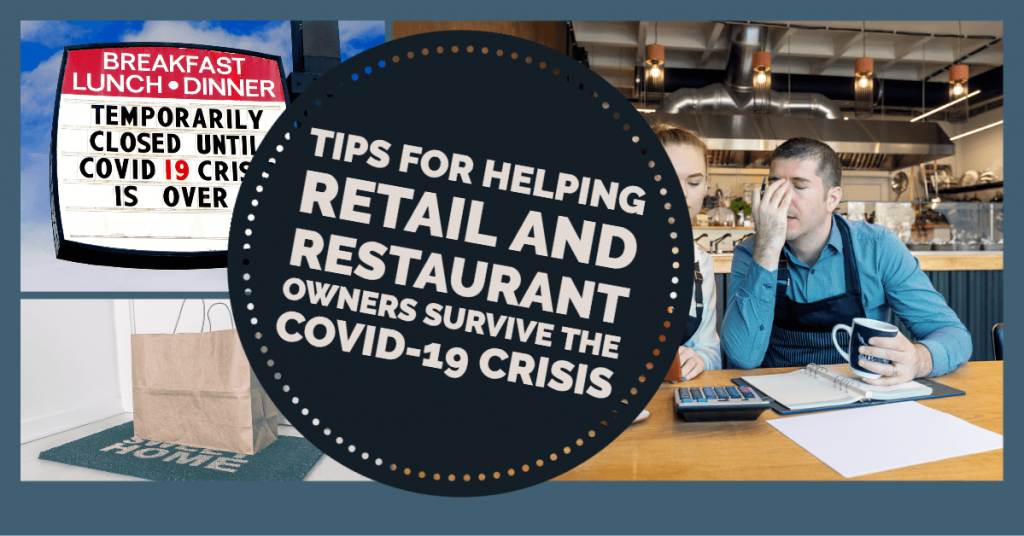
The coronavirus that causes the COVID-19 disease has created a real crisis across the country. However, it poses not only a health crisis but also an economic crisis. As a retail or restaurant owner, how can your business survive this pandemic? Although it won’t last forever, you need to make sure that your business can come out on the other side of it.
Most large companies will survive this economic hardship and experience a strong rebound once the COVID-19 crisis comes to an end. However, what about the small to medium businesses that are owned by people like you whose very livelihood rests on success?
Thankfully, you can take some steps to ensure that your business can wear the badge, “I survived COVID-19!” Below are some tips that can help your retail store or restaurant make the best of this harsh economic environment. While many states across the nation have issued stay-at-home orders, your services are still needed.
Send Out a News Release
Your first order of business is to let your customers know the action that your company is taking during the COVID-19 outbreak. An excellent way to get your message out is to publish a news release. If you’re unfamiliar with writing news releases and don’t know how to properly distribute them, though, all of your efforts will be in vain.
Thankfully, eReleases can help you not only write a news release but also distribute it nationally. In fact, eReleases can help your announcement reach all the major news outlets through its national distribution newswire. This includes helping your company connect with specific reporters, bloggers, and trade magazines within your particular industry.
Unlike some services that help you write news releases, eReleases focuses on quality over quantity. Instead of sending your release to just any journalist, it selects one that fits your needs the best. This approach produces measured results that you can’t get with other services.
The great thing about eReleases for small and medium businesses is that it handles writing news releases and distributing news releases. Getting both services from the same company saves you not only time but also money.
Take Full Advantage of Federal Relief Programs
Believe it or not, the government wants your business to survive this economic downturn just as bad as you do. For that reason, the government has put in place the Coronavirus Aid, Relief, and Economic Security Act to inject $350 billion into small businesses like yours.

The goal of the CARES Act is to help your company keep workers employed during this pandemic. Part of the program is the Paycheck Protection Program, which provides small business loans that are 100% federally guaranteed. Most importantly, the loans are likely to be forgiven if the businesses maintain their payrolls during the COVID-19 crisis.
There are other programs that you can take advantage of, too, thanks to this federal funding. For example, the Small Business Administration is set to offer loans directly to small businesses. This action is unique because the SBA typically only provides loans to businesses through authorized banks.
It’s made possible thanks to the Economic Injury Disaster Loan Program. It can provide upward of $2 million in assistance to nonprofit, private, and small businesses. To be eligible, you must meet specific criteria. According to the U.S. Chamber of Commerce, some of the requirements include:
- Have a company that employs fewer than 500 people.
- Have a business that meets the size standard set by the SBA.
- You are an individual who operates as a sole proprietor.
- You are a self-employed individual who regularly carries out business or trade.
You can learn more about these emergency, small business loans on the U.S. Chamber of Commerce or Benefits.gov websites. These loans are available to help your business survive the crisis. All you must do is apply.
See If Your Business Qualifies for a Waiver to Keep Operating
Many states, including Delaware, New Jersey, and Pennsylvania, have called for all nonessential businesses to shut down. The orders were issued to stem the spread of the COVID-19 virus. If your business isn’t essential, then you need to protect your safety and the safety of your workers and do the right thing and close.
However, you can apply for a waiver if you feel that your business is essential. Most state websites have exemptions that companies can ask for to stay open. For example, many restaurants can continue to operate delivery and carryout services.
Also, if it’s possible to run your business from home, you can continue to do so. The reason is that many states are allowing companies to continue to operate if their employees work from home.
On top of that, a lot of companies are taking advantage of the massive increase in at-home employees. Microsoft and Zoom, for instance, are offering discounts and financial incentives to encourage businesses to make the transition to telecommuting.
Make Necessary Changes Now to Save Money
Startups and small businesses typically operate under some level of uncertainty. This makes challenging times, such as this coronavirus pandemic, a real issue. In fact, such obstacles can put your company in a cash crunch fast. However, you can take a few precautions to save money now.
Remove All Nonessential Costs and Buckle Down
Were you thinking about remodeling, investing, or expanding your business? Now is not the time to have your money tied up in these endeavors. Save the cash and continue to reduce nonessential costs.
For example, experiential marketing tactics should be put on hold. Instead, focus on marketing tactics that have proved fruitful before, including cost-effective search engine optimization strategies.
This is truer for restaurants, bars, and shops that require foot traffic. Because of the pandemic, foot traffic simply isn’t there to justify these types of investments. Do yourself a favor. Hunker down and use the savings that you currently must survive.
Reach Out to Your Lender
It’s always in your lender’s best interest if you don’t default on a business loan. As a result, it’s worth reaching out to your lender and explaining your current situation. Several other small businesses are likely doing the same.
Right now, most lenders are making special exceptions and deferments considering the current COVID-19 crisis and economic situation. After all, proactive measures like this show ethical responsibility on your part, and lenders like that. However, don’t wait until you’ve already missed a payment to take action. Act now to put your best foot forward.
Expect Changing Terms
Have you been planning or doing research into getting a loan? If so, it may be time to rethink your strategy. Right now, you can expect lower loan amounts, higher interest rates, and shorter terms. This is even more true if you plan to do business with an online lender.
There’s one exception, though: an SBA loan. The government is all set to pour hundreds of billions of dollars into the SBA. The whole goal is to make sure that small businesses continue to get favorable terms on the loans that they need.
Consider Getting Your Tax Refund Sooner Rather Than Later
You’ve more than likely heard that the Department of the Treasury has extended the date for filing tax returns from April 15 to July 15. This includes extending the requirement for you to pay your final 2019 tax payment.
However, what if you’re due a refund? If you are, it’s a good idea to file your taxes sooner rather than later. After all, no refund can be paid until you submit your tax forms. Just because there’s an extension doesn’t mean that you should wait. Talk to your accountant to determine the best course of action for your business.
Talk to Your Suppliers
If you run a business, then you may have suppliers. Now is an excellent time to talk to the largest suppliers to request any help that they can provide. Some major vendors are following in the footsteps of big companies, such as JP Morgan and Facebook, that are offering small business grants.
The programs are aimed at helping individuals during this time of need. Still, some suppliers are extending this goodwill to small businesses as well. For example, they may be extending deadlines for payments or even waiving fees.
Why are vendors doing this? They want to keep your business. If a lot of small companies close their doors, then they’ll lose a lot of customers before the crisis is over. If they can do something to ease your stress, they might be willing to do it.
Despite that, most vendors won’t reach out to every client that they have. Some of them serve hundreds, if not thousands, of businesses. Because of that, it’s up to you to take the first step. This is a small price to pay if it might help you save your company.
Remember That You Still Need Your Employees
One of the biggest mistakes that a company can make during the COVID-19 situation is to think that cutting employees is the best way to save money. This crisis won’t last forever. When it ends, you’ll still need workers to help run your business.
Just weeks before the COVID-19 pandemic, one of the biggest problems that companies faced around the nation was finding employees. This was especially true for companies that needed part-time workers. For this reason, it’s more important than ever to show your employees that you care and that you won’t cut them.
Recently, federal legislation came into effect that requires employers with less than 500 employees to pay for family and sick leave. The good news is that there’s a tax credit to take advantage of if your business does this.
If you run a business with less than 50 people, though, the Department of Labor can exempt you from complying with the new legislation. The reason is that the new law jeopardizes the viability of your business.
In either case, remember that you’ll need your employees eventually. Now is an excellent time to practice good communication by keeping them informed about what’s going on. Take care of them, and they’ll take care of you.
How to Prepare Your Physical Store for a COVID-19 Closure

If you’re among the millions of retailers that run physical stores, there’s a good chance that you might have to close your doors to the public until this COVID-19 outbreak is under control. Even as you read this, you may have already closed your doors to the public.
Shutting down because of the COVID-19 situation is different from merely locking up your store for the night. To survive this crisis, you should follow this checklist, which covers most of the essentials.
Closing the Store
Your first step is to walk through the sales floor to inspect each area. This includes the stockroom, restrooms, and service areas. If there’s anything that requires your attention, take care of it now.
Also, take this time to deep clean the whole store. With it closed to the general public, now is a fantastic time to do additional cleaning that you typically can’t do when you’re open. If you still have staff members, have them clock in to help you during this cleaning process. They’ll appreciate the hours, and you’ll enjoy the assistance.
As you finish cleaning, repair the sales floor for when you reopen. Since no one knows for sure when that will happen, it’s good to be prepared and ready to go. This will prevent you from having to rush to get things prepared in the days before you eventually welcome the public again.
With everything in place and ready to go, take some photos of the store. You want to have a record of precisely what the store looks like before you close. These photos could come in handy if anything happens, such as vandalism, while the store is closed.
Also, walk around your store to ensure that all your electronics are turned off. There’s no reason to increase your energy bill for electronics that no one is using. This includes turning off your open and closed sign if you have one. Instead, tape a note to the inside of your door that explains the closure because of the COVID-19 outbreak.
It might be helpful to leave an email contact address on the note as well. If you have an online store, also include the web address. This might boost sales on your website since you can’t sell anything in your store.
Next, it’s essential to contact the post office to hold your mail if you get mail at your store. Depending on how long the COVID-19 outbreak lasts, you might have to visit your local post office to pick up your mail from time to time.
Lastly, test your fire alarm, and set your thermostat to an appropriate level. No one will be in the store, so you probably won’t need the air conditioning or heating on for comfort purposes. However, you need to keep it on to prevent humidity and the formation of mold.
Store Security
With your store ready for closure, it’s time to think about security. After all, you won’t be at your store every day to ensure that everything is safe. This is a great time to make sure that your security system is up to date and working.
You should also remove all personal valuables that you might keep at the store. This includes but isn’t limited to cellphones, jewelry, and laptops. Frequently, personal items like these aren’t covered in insurance policies, so you want to avoid leaving them at the store.
On top of that, you should remove all the cash in your store, and deposit it into your company’s bank account. The only exception to this is if you have an immovable safe. Since you won’t be opening for business every day, you can take the petty cash that you generally keep on hand to the bank as well.
Taking Care of Your Employees
It’s crucial to let your store associates know that you’re closing the store. You can give them their paychecks for any unpaid time. Also, check your state laws to determine if you’re required to pay for unused vacation or sick leave.
However, it’s a good idea to keep some staff on your payroll to help you with online sales if you have a web store. If you run a restaurant, you’ll want to save some staff so that you can provide carryout or curbside pickup services.
If you’re not an essential retailer, you can help your employees get unemployment insurance. The government is making it easier for employees to get unemployment benefits during this COVID-19 crisis. If you plan to reopen, let your workers know that you may need them once this crisis is over.
This is why keeping a line of communication open between you and your employees is essential. You can let them know the next plan of action when business picks up again.
Don’t Stop Communicating with Customers

Ongoing communication is vital with not only your employees but also your customers. If you have an online presence, now is the time to rely on it to drive traffic to your website. Invest any money that you can into putting content on your website and focus on SEO.
If you have an Instagram or Facebook account, post frequently. Keep your customers up to date on your store’s situation and let them know that they can still buy your goods online. This is an era when you can easily communicate with people like never before. You can even do live broadcasts on social media platforms.
Do you have a list of your customers’ email addresses? If so, now is a good time to do a big email blast. In the email, let them know that your store is closed and where they can reach you online. Also, answer frequently asked questions, and tell them about your social media channels.
You can even go as far as to encourage online purchases. Hold sales and discounts online that you can post to your social media accounts to keep the communication going. While you might not want to hold a promotion right now, having some business coming in is better than none.
Additionally, you can encourage the sale of gift cards. When your store reopens, you’ll want people to come shopping. Over half the people who use a gift card end up spending more than the amount on the card. Also, every dollar spent on a gift card is one that is guaranteed to be spent at your store.
In fact, many customers are showing loyalty to their favorite stores right now by buying gift cards. They know that buying them helps keep the stores afloat during these tough times.
Final Thoughts
Above all else, your goal is to make sure that your store makes it through the COVID-19 pandemic. Right now, it may seem like it’s never going to end, but things will eventually return to normal. Using these tips, you can ensure that your store is still around to take advantage of the economic boom that’s likely to follow. By that point, people will be dying to spend some time outside.
While you can’t open your store right now, you can still visit your store often. Use this time to achieve any goals that are hard to complete during regular operating hours. Maybe you could rearrange the store or get an accurate inventory count.
Don’t forget to check out eReleases for all your news release needs. Releases are a great way to keep your customers informed and continue to market yourself in a good light even during this economic downturn. Unlike other forms of marketing, it’s affordable, which is essential right now.
Lastly, take full advantage of the financial aid that the government is pouring into small businesses. Help is out there if you want it. You must apply for it.